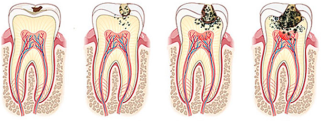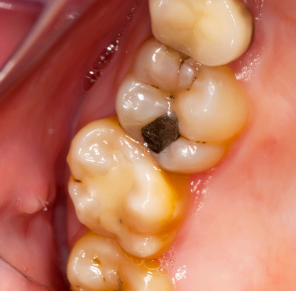My first blog!
Blog
"I'll wait until it hurts."
Karlee Pape 03/27/2017
There is a phrase that some people say after their dental appoitnment regarding their diagnosed treatment, "I'll wait until it hurts." This phrase is said often times due to fear, anxiety, time, and finances.
I am going to tell you why you should not "wait until it hurts." Often times we diagnose treatment pretty early on for example, cavities, we can catch them when they are just forming which is the best time to fix them. They're small and much more cost effective for you to have repaired. Refer to the picture above to see the stages of decay as it grows. The third and fourth stage depicted above are most likely the stages that hurt. As you can see the decay has grown much bigger and in the fourth picture is completely into the nerve of the tooth.
Waiting until it hurts is going to cost you more money because the treatment will actually be changing. As the filling grows the cost of the procedure grows as it becomes more complex to repair. Waiting too long may mean you no longer need to repair a tiny cavity but need to get a root canal and a crown or even an extraction and by the time it does hurt these are usually the options that you are facing.
We want to help save you time and money by diagnosing your treatment as early as possible and help you prevent any potential pain.
Does My Insurance Cover it?
Karlee Pape 10/21/2016
Insurances can be very complicated. The question is not always if your insurance covers it, but what percentage do they cover it at. As mentioned in a previous blog post, we are in network with most insurance plans. By being in network most insurance plans we are accepting the insurance rates from your plan which grant you huge discounts. In addition to the discounts your insurance will usually pay a portion of the services performed. Many plans will pay 100% for routine services such as a dental cleaning and check ups.
Most other services the insurance will pay a portion of the procedure.
The typical breakdown of coverage that we see is..
Preventative/ Diagnostic procedures covered at 100%. (This is your cleaning exam and xrays)
Basic Services covered @80%. (This is your fillings, root canals, deep cleanings, and extractions)
Major Services covered at 50%. ( These are your crowns, bridges, and implants)
This is the most common dispersement of benefits we see, though your specific plan may vary, as some do. It is important that you are familiar with your coverage as well so there are no surprises when you are given your treatment plan and fees.
Although we would love to have a hand in deciding your coverage dispersment your plan details are 100% agreed upon by your insurance plan and your employer.
We are happy to verify your coverage and file your insurance claims for you, a service that we chose to provide to help you. This helps minimize unexpected costs and delays.
Why Do We Go To The Dentist?
Why Should I Go To an In Network Provider?
Karlee Pape- 09/23/2016
One of the biggest questions we are asked is, "Are you in network with my plan?" Let me answer that question as it relates to our office. We are in network with most, if not all, major insurance plans. We try to be the most convenient office around by being in network with many plans. Why is being in network significant? Being in network is significant as it pertains to the fees our office can bill. The insurance dictates a fee for all services, These fees are often 30-60% of our office fee.This will enable you to receive a major discount just for going to our office. How does this compare to an out of network office? An out of network office can bill you up to their office fees. The insurance may have a max fee they will pay for a particular service and an out of network office can bill you beyond that fee.
OUT OF NETWORK EXAMPLE:
The insurance pays @ 100% of $150 for your cleaning, exam, and xrays.
The out of network office fee is $256 for the cleaning, exam, and xrays.
This means: YOU, being the patient, will pay the difference of $106
IN NETWORK EXAMPLE:
The insurance pays @ 100% of $150 for your cleaning, exam and xrays.
The in network office can not collect any additional payment from the patient.
This means: YOU, being the patient, will pay nothing out of pocket!
What is the difference between being, "In Network" and "Taking/Accepting" your plan.
-Being in network is simple. We are contracted with your insurance and bound by a contract.
-"Accepting" or "Taking" a plan does not mean the office is in network. It means they accept the plan and essentially the office is not bound by a contract or contracted fees.








